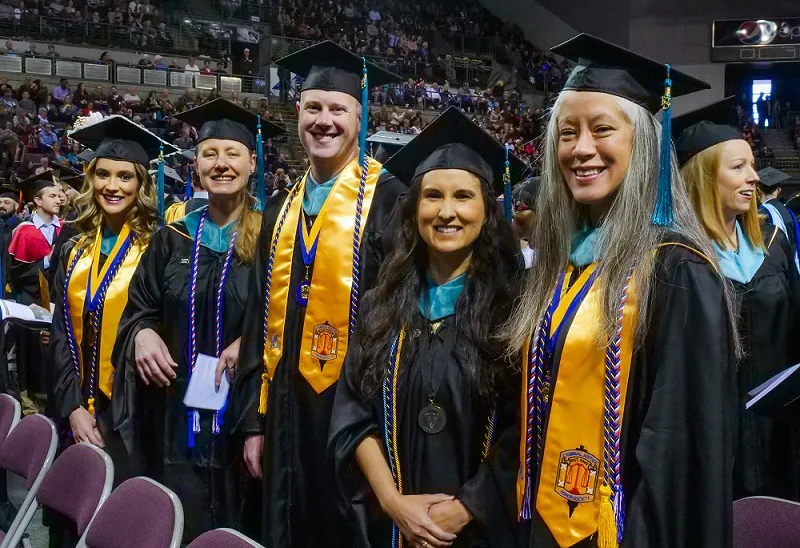
Scholarships and Grants
Connecting You to UCCS Scholarships & Beyond
Beyond financial aid and education loans, transfer students may apply for a variety of scholarships and grants that can help fund parts or all of a degree program. Use this page as your guide to different types of scholarships and grants. If you need extra information or help, please contact the Financial Aid office.
Scholarship Information

UCCS is ready to assist students searching for scholarships
Each year, UCCS students are awarded almost $12 million in scholarships from institutional, local, state and national sources. Visit our scholarships section to learn about the many scholarship opportunities offered, both internal and external.
Scholarship FAQs
Are you seeking scholarships from both the university and outside sources? We are here for you. Common scholarships include:
Automatic scholarships
- * Chancellor's Award
- * Peak scholarship
Scholarships you must apply to:
- * Reicher Scholarship
- * Kane Scholarships
- * Karen Possehl
- * Nontraditional Student Scholarship
The best way to apply to scholarships is online, via your myUCCS Portal account. New students will receive a Student ID and instructions on claiming their account, then they can begin applying for scholarships. Certain scholarships have different rules for applying: some require students to answer questions with written responses.
- he deadline to apply for most internal Spring 2020 scholarships is February 1 and March 1. The deadline to apply to most external scholarships varies depending on the type of scholarship and award. Look at our lists of scholarships or speak to Financial Aid to find the best date to apply.
The UCCS Community Support Scholarship Application is used to distribute scholarships from:
- All Colorado Beer Festival Scholarship
- Pikes Peak Club Building Bridges Scholarship
- LAS Emergency Scholarship
- College of Business Helping Hand Fund
Applications will be collected during the following windows:
- October 15th to November 1st
- December 1st to December 15th
- February 15th to March 1st
- April 1st to April 15th
Committee reviews of applications will be conducted within one month of the application deadlines listed above. Applicants will be notified via email of the results.
- Complete your application in two phases: a rough draft that answers all questions completely, and a final draft, which incorporates the feedback of an outside editor who has checked your application for errors.
- Write a unique application for each essay prompt that is different from the general application materials, even if the questions are similar. Focus on academic goals related to your specific major or career choice.
- Research and submit to “Apply To” opportunities, which are recommended to you after your General Application and Conditional Applications are complete. These “Apply To” grants typically offer a lot of money and even full-ride awards.
- Plan ahead to meet your application deadline.
- Make sure your essay prompts and answered questions leave a lasting impression and spotlight your willingness to learn.
- Do not assume you are not eligible: If you have a lower GPA or subpar test scores, you may still meet minimum requirements for certain scholarships. Other factors can count toward getting awards. Talk to the Financial Aid office for more guidance.
- Carefully read the scholarships Frequently Asked Questions (FAQ) page for more information.
Get Grants

Grants are a form of gifted aid that are automatically awarded to students who meet certain eligibility requirements.
Unlike loans, grants do not have to be repaid. Grants may be used for tuition, fees, books, room, and board, and other miscellaneous education expenses. Students who submit a FAFSA are automatically considered for grants. This is because grants are awarded based on financial need as determined by a student’s FAFSA. The Financial Aid department will evaluate eligibility and notify students of their awards with an Award Letter.
Grant FAQs
Common grants include Federal Pell Grants, the Federal Supplemental Educational Opportunity Grant (FSEOG), the Colorado Student Grant, and the UCCS Tuition Grant. Learn more about award amounts and eligibility requirements for 2020 grants on the Grants webpage.
Federal Pell Grants are awarded to students who need financial assistance and have not earned a degree. Pell Grant award amounts vary depending on a student’s Expected Family Contribution (EFC), an estimated measure of how much the student or their family will contribute toward education expenses. There are different types of Pell Grants, including Lifetime Limit, Crossover Pell, and the Year-Round Pell. Learn more about Pell Grants via the Grants section.
- Funding can be requested from UCCS’ individual colleges for various projects, including research. Contact Financial Aid for more information about specific funding opportunities.
- The College Opportunity Fund provides stipends for in-state students attending school in Colorado. To receive the stipend, a student must apply for and authorize the use of the stipend at their respective institution. The stipend replaces traditional direct legislative appropriations to the state’s colleges and universities. Without the stipend, a student is responsible for the full amount of tuition which equals in-state tuition plus the stipend amount. The goal of the COF program is to bring awareness to Colorado resident students that state funds exist to help finance their college education and improve access with a particular emphasis on higher education/K-12 linkages and strengthening accountability. Learn more.
A return on investment. A degree to fuel your future.

Investing in yourself
The median salary for a UCCS alum just one year after graduating with a Bachelor's degree is greater than $37,700, which is higher than the median salary among all Colorado institutions. That median salary only grows over time. After 10 years, the median salary for UCCS graduates with a Bachelor's degree is greater than $58,700.